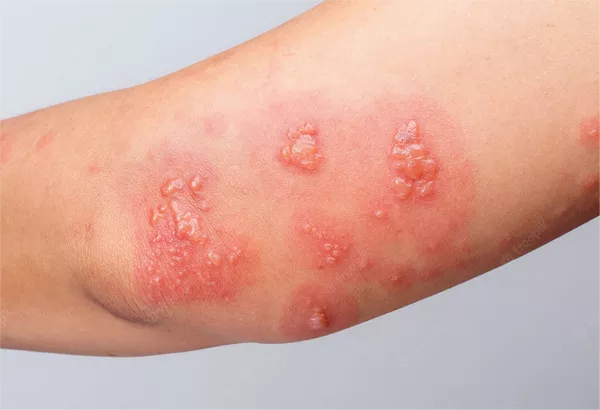Chickenpox and shingles are two conditions caused by the same virus, the varicella-zoster virus (VZV). While chickenpox is commonly experienced in childhood, shingles typically affects older adults. This connection raises an important question: does having chickenpox prevent shingles? To answer this, we need to delve into the nature of VZV, how it behaves in the body, and what factors influence the development of shingles later in life.
Understanding the Varicella-Zoster Virus
The varicella-zoster virus is a member of the herpesvirus family. It is responsible for causing two distinct clinical conditions: varicella (chickenpox) and herpes zoster (shingles).
Chickenpox is an acute infection characterized by a blister-like rash, itching, and fever. It is highly contagious and spreads through respiratory droplets and direct contact with the lesions. Most people contract chickenpox in childhood, which typically provides lifelong immunity against the disease. However, this does not mean that the virus is eradicated from the body after recovery.
The Latent Phase of Varicella-Zoster Virus
After the initial infection resolves, VZV remains in the body in a latent state. It resides in the dorsal root ganglia—clusters of nerve cells near the spinal cord and brain. This latency can persist for decades without causing any symptoms or health issues.
The body’s immune system keeps the virus in check during this latent phase. However, various factors, particularly aging and immune system decline, can trigger the reactivation of the virus. When reactivated, VZV travels along the nerve fibers to the skin, resulting in shingles.
What is Shingles?
Shingles, or herpes zoster, presents as a painful rash that usually affects one side of the body or face. It can be extremely debilitating, often accompanied by burning pain, itching, and sensitivity. The rash consists of blisters similar to those seen in chickenpox, but they are typically localized rather than widespread.
Postherpetic neuralgia (PHN) is a common complication of shingles, where severe pain persists even after the rash has healed. This condition can significantly impair quality of life, particularly in older adults.
Does Chickenpox Provide Immunity to Shingles?
One might wonder if the initial chickenpox infection provides immunity to shingles, similar to how it prevents reinfection with chickenpox. The answer is both yes and no.
Yes, having chickenpox generally means that you will not contract chickenpox again because your body has developed specific immunity to VZV. However, the immunity developed against the initial infection does not prevent the virus from reactivating later as shingles. In fact, having had chickenpox is a prerequisite for developing shingles because it indicates that VZV is present in your body.
Factors Influencing Shingles Development
Several factors can increase the risk of shingles, even if you have had chickenpox:
- Age: The risk of shingles increases with age. Individuals over 50 are at a higher risk, with the incidence rising significantly in those over 60.
- Weakened Immune System: Conditions that weaken the immune system, such as HIV/AIDS, cancer, or treatments like chemotherapy and steroids, can increase the likelihood of VZV reactivation.
- Stress and Trauma: Severe physical or emotional stress and trauma can contribute to the reactivation of VZV.
- Medical Conditions: Chronic illnesses like diabetes, chronic kidney disease, and autoimmune diseases can also elevate the risk.
SEE ALSO: How Long Does Nausea Last with Shingles
Vaccination and Shingles Prevention
While having had chickenpox does not prevent shingles, there are effective vaccines available that can significantly reduce the risk.
1. The Chickenpox Vaccine
Introduced in the mid-1990s, the varicella vaccine is administered to children to prevent chickenpox. This vaccine has dramatically reduced the incidence of chickenpox and its associated complications. However, it also raises questions about the long-term risk of shingles. Some studies suggest that vaccinated individuals may have a lower risk of shingles because the vaccine virus strain is less likely to reactivate than the wild-type virus. However, more research is needed to fully understand this relationship.
2. The Shingles Vaccine
For those who have had chickenpox, the shingles vaccine (herpes zoster vaccine) is recommended, particularly for adults over 50. There are two vaccines available: Zostavax, a live attenuated vaccine, and Shingrix, a recombinant subunit vaccine.
- Zostavax: This vaccine reduces the risk of shingles by about 51% and PHN by 67%. It is given as a single injection.
- Shingrix: Approved in 2017, Shingrix is more effective, reducing the risk of shingles by over 90% and is administered in two doses. Shingrix has become the preferred vaccine due to its higher efficacy.
The Role of Immune Memory
The immune system’s ability to remember the varicella-zoster virus from the initial chickenpox infection plays a crucial role in how the body responds to the virus later in life. However, immune memory alone is not sufficient to prevent shingles. Over time, the immune system’s ability to control latent VZV diminishes, particularly as cell-mediated immunity (critical for controlling herpesvirus infections) declines with age.
The shingles vaccine works by boosting the immune system’s response to VZV, reinforcing the body’s defenses and helping to keep the virus in its dormant state. This is why vaccination is recommended even for those who have had chickenpox.
Conclusion
In conclusion, while having chickenpox provides immunity against reinfection with the varicella-zoster virus, it does not prevent the development of shingles. The virus remains dormant in the body and can reactivate later in life, causing shingles. The risk of shingles increases with age and other factors that weaken the immune system.
Vaccination against shingles is an effective preventive measure, particularly for older adults. By boosting the immune response to VZV, the shingles vaccine significantly reduces the risk of both shingles and its complications. Understanding the relationship between chickenpox and shingles highlights the importance of vaccination and ongoing research to improve prevention strategies for this painful condition.
Related Topics:


























